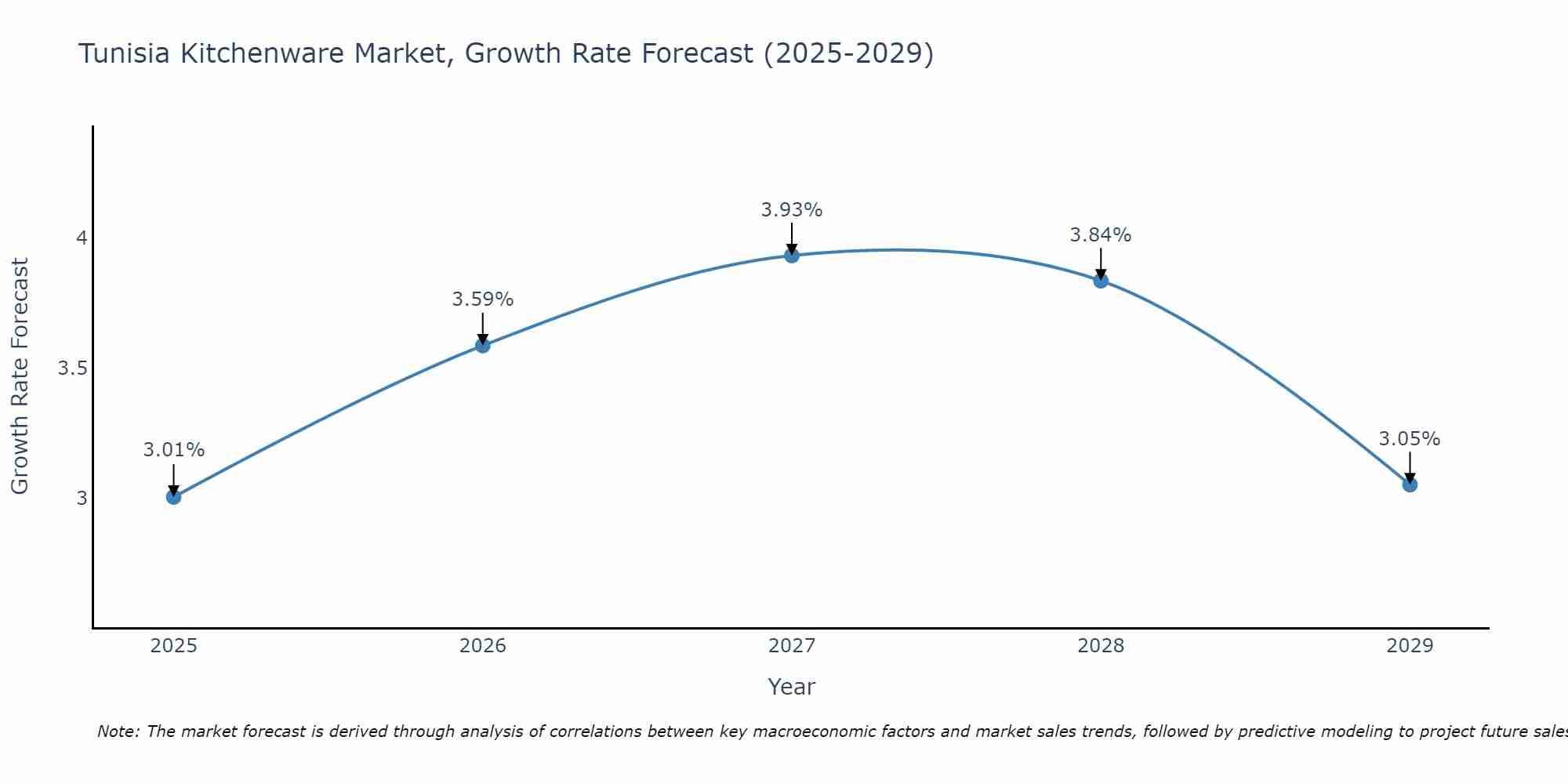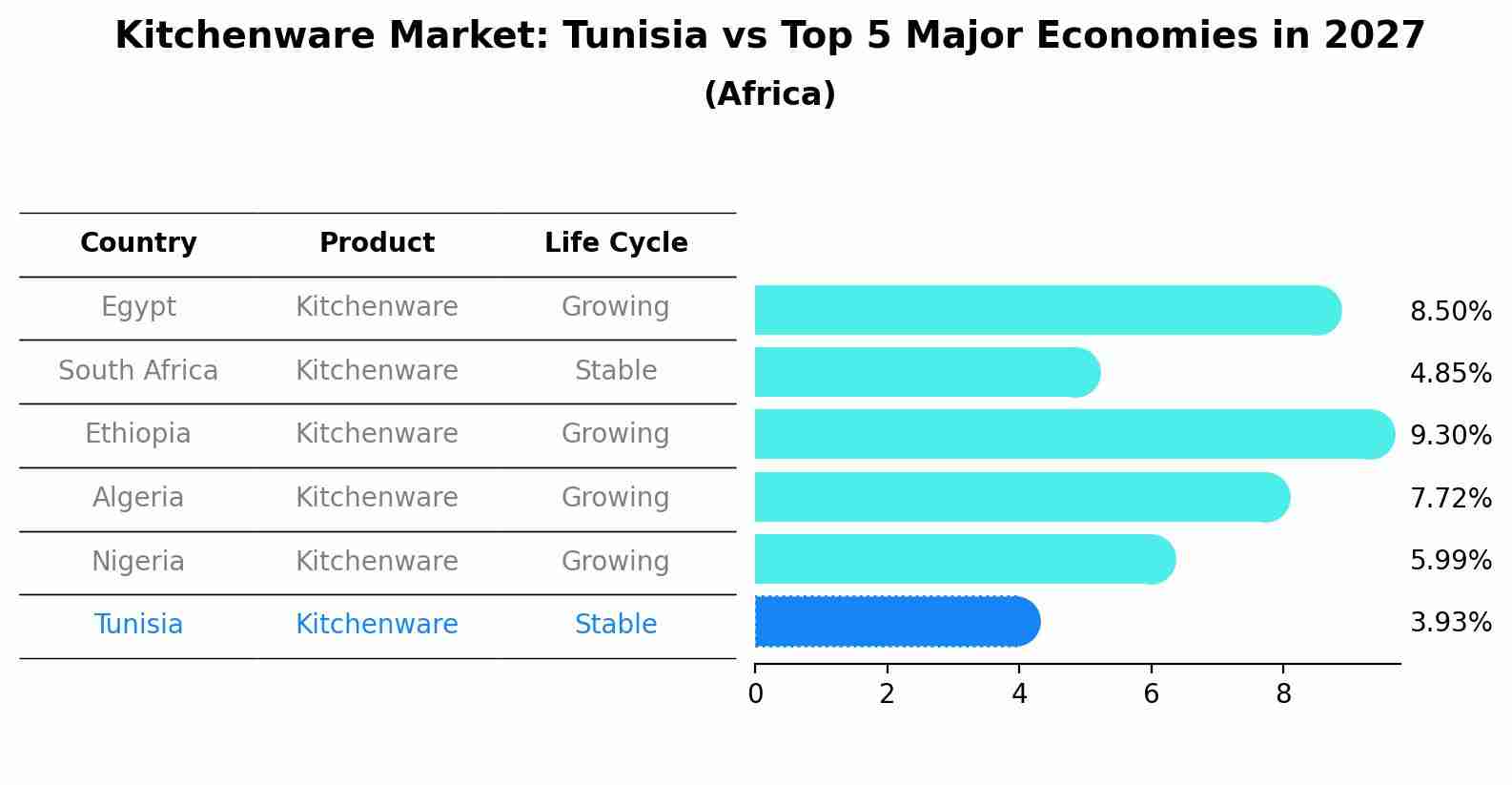Tunisia Kitchenware Market Outlook | Share, COVID-19 IMPACT, Size, Analysis, Trends, Revenue, Forecast, Value, Industry, Growth & Companies
| Product Code: ETC377094 | Publication Date: Aug 2022 | Updated Date: Jul 2025 | Product Type: Market Research Report | |
| Publisher: 6Wresearch | Author: Ravi Bhandari | No. of Pages: 75 | No. of Figures: 35 | No. of Tables: 20 |
Tunisia Kitchenware Market Size Growth Rate
The Tunisia Kitchenware Market is projected to witness mixed growth rate patterns during 2025 to 2029. Growth accelerates to 3.93% in 2027, following an initial rate of 3.01%, before easing to 3.05% at the end of the period.

Kitchenware Market: Tunisia vs Top 5 Major Economies in 2027 (Africa)
The Kitchenware market in Tunisia is projected to grow at a stable growth rate of 3.93% by 2027, highlighting the country's increasing focus on advanced technologies within the Africa region, where Egypt holds the dominant position, followed closely by South Africa, Ethiopia, Algeria and Nigeria, shaping overall regional demand.

Tunisia Kitchenware Market Synopsis
The Tunisia kitchenware market is characterized by a growing demand for modern and innovative kitchen products, driven by changing consumer lifestyles and increasing disposable income. Traditional kitchenware items such as tagines, couscous pots, and baklava trays continue to be popular, but there is a rising trend towards more contemporary and convenient kitchen tools and gadgets. The market is witnessing a surge in the adoption of energy-efficient and durable cookware, as well as a preference for multifunctional appliances that save time and space in the kitchen. Key players in the Tunisia kitchenware market include local manufacturers as well as international brands catering to a diverse consumer base. Retail channels such as specialty stores, hypermarkets, and online platforms play a crucial role in the distribution of kitchenware products across the country.
Tunisia Kitchenware Market Trends
The Tunisia Kitchenware Market is experiencing a shift towards more sustainable and eco-friendly products, with a growing demand for items made from natural materials such as bamboo, wood, and stainless steel. Consumers are increasingly seeking products that are durable, long-lasting, and environmentally friendly. Additionally, there is a rising interest in innovative and multi-functional kitchenware solutions that help save time and space in the kitchen. The market is also seeing a trend towards modern and stylish designs, reflecting changing consumer preferences for aesthetics in kitchen products. Overall, the Tunisia Kitchenware Market is evolving towards more sustainable, practical, and aesthetically pleasing options to meet the demands of today`s consumers.
Tunisia Kitchenware Market Challenges
In the Tunisia kitchenware market, challenges include increasing competition from both domestic and international brands, which can make it difficult for smaller local players to establish themselves. Additionally, economic fluctuations and consumer spending patterns can impact the demand for kitchenware products. Import restrictions and trade barriers may also hinder the market`s growth potential by limiting access to certain products or materials. Furthermore, changing consumer preferences and trends towards more modern and innovative kitchenware designs can pose a challenge for traditional manufacturers who may struggle to adapt quickly to these evolving demands. Overall, navigating these challenges requires market players to stay agile, innovative, and responsive to dynamic market conditions in order to remain competitive and sustain growth in the Tunisia kitchenware market.
Tunisia Kitchenware Market Investment Opportunities
The Tunisia kitchenware market presents various investment opportunities due to increasing consumer interest in cooking and dining experiences. Key areas for investment include high-quality cookware and bakeware, innovative kitchen gadgets and tools, and stylish tableware and serving ware. With a growing emphasis on healthy eating and home cooking, there is a demand for kitchenware products that are durable, functional, and aesthetically pleasing. Additionally, the rise of social media influencers and cooking shows has further fueled the desire for trendy and Instagram-worthy kitchenware items. Investing in the Tunisia kitchenware market offers the potential for growth and profitability as consumers seek to enhance their culinary skills and elevate their dining experiences at home.
Jordan Agar Market Government Policies
Government policies related to the Tunisia Kitchenware Market focus on promoting domestic production, supporting small and medium enterprises (SMEs), and ensuring product quality and safety standards. The Tunisian government provides incentives and subsidies to local manufacturers to boost production and competitiveness in the kitchenware industry. Additionally, regulations are in place to enforce quality control measures, including inspections and certifications, to maintain consumer confidence in the market. The government also encourages innovation and technological advancements in the sector through research and development grants. Overall, the government policies aim to stimulate growth and sustainability in the Tunisia Kitchenware Market while safeguarding the interests of consumers and local businesses.
Tunisia Kitchenware Market Future Outlook
The Tunisia kitchenware market is expected to witness steady growth in the coming years, driven by factors such as increasing disposable income levels, changing consumer lifestyles, and a growing preference for convenient and innovative kitchen products. With a rising trend towards home-cooked meals and culinary experimentation, there is a growing demand for high-quality kitchenware items such as cookware, bakeware, and kitchen gadgets. Additionally, the influence of global culinary trends and social media platforms showcasing food and cooking are likely to further boost market growth. Manufacturers and retailers in the Tunisia kitchenware market are expected to focus on product innovation, sustainability, and online sales channels to cater to the evolving needs and preferences of consumers, thereby shaping a positive outlook for the industry.
Key Highlights of the Report:
- Tunisia Kitchenware Market Outlook
- Market Size of Tunisia Kitchenware Market, 2021
- Forecast of Tunisia Kitchenware Market, 2031
- Historical Data and Forecast of Tunisia Kitchenware Revenues & Volume for the Period 2018 - 2031
- Tunisia Kitchenware Market Trend Evolution
- Tunisia Kitchenware Market Drivers and Challenges
- Tunisia Kitchenware Price Trends
- Tunisia Kitchenware Porter's Five Forces
- Tunisia Kitchenware Industry Life Cycle
- Historical Data and Forecast of Tunisia Kitchenware Market Revenues & Volume By Product Type for the Period 2018 - 2031
- Historical Data and Forecast of Tunisia Kitchenware Market Revenues & Volume By Cookware for the Period 2018 - 2031
- Historical Data and Forecast of Tunisia Kitchenware Market Revenues & Volume By Bakeware for the Period 2018 - 2031
- Historical Data and Forecast of Tunisia Kitchenware Market Revenues & Volume By Others for the Period 2018 - 2031
- Historical Data and Forecast of Tunisia Kitchenware Market Revenues & Volume By End User for the Period 2018 - 2031
- Historical Data and Forecast of Tunisia Kitchenware Market Revenues & Volume By Residential Kitchen for the Period 2018 - 2031
- Historical Data and Forecast of Tunisia Kitchenware Market Revenues & Volume By Commercial Kitchens for the Period 2018 - 2031
- Historical Data and Forecast of Tunisia Kitchenware Market Revenues & Volume By Sales Channel for the Period 2018 - 2031
- Historical Data and Forecast of Tunisia Kitchenware Market Revenues & Volume By Online for the Period 2018 - 2031
- Historical Data and Forecast of Tunisia Kitchenware Market Revenues & Volume By Offline for the Period 2018 - 2031
- Tunisia Kitchenware Import Export Trade Statistics
- Market Opportunity Assessment By Product Type
- Market Opportunity Assessment By End User
- Market Opportunity Assessment By Sales Channel
- Tunisia Kitchenware Top Companies Market Share
- Tunisia Kitchenware Competitive Benchmarking By Technical and Operational Parameters
- Tunisia Kitchenware Company Profiles
- Tunisia Kitchenware Key Strategic Recommendations
Frequently Asked Questions About the Market Study (FAQs):
Export potential assessment - trade Analytics for 2030
Export potential enables firms to identify high-growth global markets with greater confidence by combining advanced trade intelligence with a structured quantitative methodology. The framework analyzes emerging demand trends and country-level import patterns while integrating macroeconomic and trade datasets such as GDP and population forecasts, bilateral import–export flows, tariff structures, elasticity differentials between developed and developing economies, geographic distance, and import demand projections. Using weighted trade values from 2020–2024 as the base period to project country-to-country export potential for 2030, these inputs are operationalized through calculated drivers such as gravity model parameters, tariff impact factors, and projected GDP per-capita growth. Through an analysis of hidden potentials, demand hotspots, and market conditions that are most favorable to success, this method enables firms to focus on target countries, maximize returns, and global expansion with data, backed by accuracy.
By factoring in the projected importer demand gap that is currently unmet and could be potential opportunity, it identifies the potential for the Exporter (Country) among 190 countries, against the general trade analysis, which identifies the biggest importer or exporter.
To discover high-growth global markets and optimize your business strategy:
Click Here- Single User License$ 1,995
- Department License$ 2,400
- Site License$ 3,120
- Global License$ 3,795
Search
Thought Leadership and Analyst Meet
Our Clients
Related Reports
- India Switchgear Market Outlook (2026 - 2032) | Size, Share, Trends, Growth, Revenue, Forecast, Analysis, Value, Outlook
- Pakistan Contraceptive Implants Market (2025-2031) | Demand, Growth, Size, Share, Industry, Pricing Analysis, Competitive, Strategic Insights, Strategy, Consumer Insights, Analysis, Investment Trends, Opportunities, Revenue, Segments, Value, Segmentation, Supply, Forecast, Restraints, Outlook, Competition, Drivers, Trends, Companies, Challenges
- Sri Lanka Packaging Market (2026-2032) | Outlook, Competition, Drivers, Trends, Demand, Pricing Analysis, Competitive, Strategic Insights, Companies, Challenges, Strategy, Consumer Insights, Analysis, Investment Trends, Opportunities, Growth, Size, Share, Industry, Revenue, Segments, Value, Segmentation, Supply, Forecast, Restraints
- India Kids Watches Market (2026-2032) | Strategy, Consumer Insights, Analysis, Investment Trends, Opportunities, Growth, Size, Share, Industry, Revenue, Segments, Value, Segmentation, Supply, Forecast, Restraints, Outlook, Competition, Drivers, Trends, Demand, Pricing Analysis, Competitive, Strategic Insights, Companies, Challenges
- Saudi Arabia Core Assurance Service Market (2025-2031) | Strategy, Consumer Insights, Analysis, Investment Trends, Opportunities, Growth, Size, Share, Industry, Revenue, Segments, Value, Segmentation, Supply, Forecast, Restraints, Outlook, Competition, Drivers, Trends, Demand, Pricing Analysis, Competitive, Strategic Insights, Companies, Challenges
- Romania Uninterruptible Power Supply (UPS) Market (2026-2032) | Industry, Analysis, Revenue, Size, Forecast, Outlook, Value, Trends, Share, Growth & Companies
- Saudi Arabia Car Window Tinting Film, Paint Protection Film (PPF), and Ceramic Coating Market (2025-2031) | Strategy, Consumer Insights, Analysis, Investment Trends, Opportunities, Growth, Size, Share, Industry, Revenue, Segments, Value, Segmentation, Supply, Forecast, Restraints, Outlook, Competition, Drivers, Trends, Demand, Pricing Analysis, Competitive, Strategic Insights, Companies, Challenges
- South Africa Stationery Market (2025-2031) | Share, Size, Industry, Value, Growth, Revenue, Analysis, Trends, Segmentation & Outlook
- Afghanistan Rocking Chairs And Adirondack Chairs Market (2026-2032) | Size & Revenue, Competitive Landscape, Share, Segmentation, Industry, Value, Outlook, Analysis, Trends, Growth, Forecast, Companies
- Afghanistan Apparel Market (2026-2032) | Growth, Outlook, Industry, Segmentation, Forecast, Size, Companies, Trends, Value, Share, Analysis & Revenue
Industry Events and Analyst Meet
Whitepaper
- Middle East & Africa Commercial Security Market Click here to view more.
- Middle East & Africa Fire Safety Systems & Equipment Market Click here to view more.
- GCC Drone Market Click here to view more.
- Middle East Lighting Fixture Market Click here to view more.
- GCC Physical & Perimeter Security Market Click here to view more.
6WResearch In News
- Doha a strategic location for EV manufacturing hub: IPA Qatar
- Demand for luxury TVs surging in the GCC, says Samsung
- Empowering Growth: The Thriving Journey of Bangladesh’s Cable Industry
- Demand for luxury TVs surging in the GCC, says Samsung
- Video call with a traditional healer? Once unthinkable, it’s now common in South Africa
- Intelligent Buildings To Smooth GCC’s Path To Net Zero


















